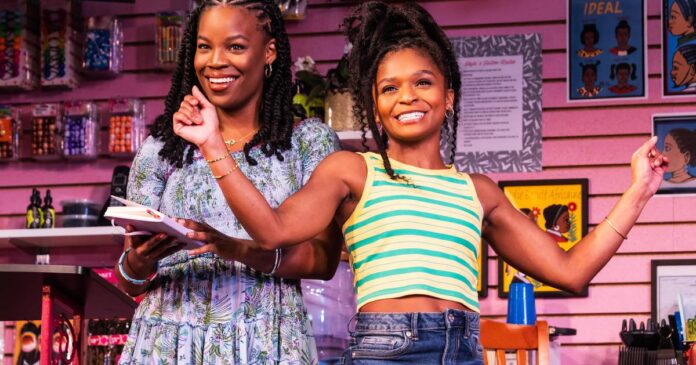
NEW YORK — The show curtain has a picture guide for the uninitiated: box braids, cornrows, micro braids, Ghana braids, tree braids. Even, if you’re lucky and the stylist is in the right mood, kinky twists.
All of these looks can be found at Jaja’s, the Harlem hair-braiding emporium at the heart of the very lively new Broadway play from Jocelyn Bioh, as directed by Whitney White and coproduced by Manhattan Theatre Club and the commercial producer Madison Wells Live.
There have been many shows — comedies such as “Steel Magnolias,” whodunits like “Shear Madness,” even operas like “The Factotum” — set in barber’s shops and hair salons over the years.
Why? Writers love them.
People come and go but stick around long enough to share their problems and reveal their personalities. Workplace conversations take place everywhere, but salons, usually dominated by folks of a single gender, make it a specialty. Plus there’s something especially intimate about somebody manipulating your hair: crabby customers become confessors and stylists become sardonic shrinks.
Salons are usually havens for gossip, always good for a laugh. But as we see in this show, they can also be safe spaces.
“Jaja’s African Hair Braiding,” which is a most fun 90 minutes, has the benefit of hair braiding being a long and complex process, requiring great manual dexterity on the part of the stylist. And, of course, it’s long been the province of solo entrepreneurs, like the women who hold down the chairs in this Harlem salon catering not just to Black Americans but to immigrant women from Africa, many of whom are experts in this craft.
Bioh’s play is what you might call closely observed; so much so, you suspect the author, who is Ghanaian American, has spent plenty of quality time in hair-braiding spots on 125th Street, where prices are established with your stylist only outside the shop, so no one hears them but the two parties involved. The show is meticulous in its recreation of this business, from the use of wigs (by Nikiya Mathis) to the authenticity of the props. Braiders, the play posits, have a common skill but a very broad variety of techniques and personalities.
In this play, the audience spends a day at Jaja’s, from the moment the metal shutters rise on David Zinn’s hyper-realistic setting to when they fall along with the sun. You hang with the shop’s Senegalese namesake (Somi Kakoma), her college-bound daughter Marie (Dominique Thorne), braider on steroids Ndidi (Maechi Aharanwa), who makes the most ca-ching, and dramatic braider Bea (Zenzi Williams), a Ghanaian gossip with a killer personality.
The moral heart of the story is Miriam, warmly played by Brittany Adebumola, a quieter spirit but the character who most embodies what Bioh clearly sees as the role of this shop in the lives of the women who work there.
Add in the customers, some kind, some rude, and you get the picture. Nothing earth-shattering occurs, not even much conflict that cannot be worked out later. This is an ensemble piece, a collection of character studies, a bubbly slice of the uptown hair-braiding life.
By design, clearly. You don’t need to be a Black woman with braids to enjoy this play: heck, it might teach you something about the intricacies of a craft you only have observed from afar. But this play is also trying to reach a Black audience, long ignored by Broadway.
It took producers a while, but there are signs in this still-young season that many have finally figured out that many of the audience members they want to reach are not looking for dramas about pain, aimed mostly at white audiences, but instead want affirmative experiences that offer laughs at human foibles and celebrate doing something really well, day in, day out.
“Jaja’s” is a comedy about life as it is lived in this place, about community, aspiration and entrepreneurship.
Mostly, though, it’s a show about immigrants getting the job done, and having fun doing it, one braid at a time.
At the Samuel J. Friedman Theatre, 261 W. 47th St., New York; www.manhattantheatreclub.com
Chris Jones is a Tribune critic.



